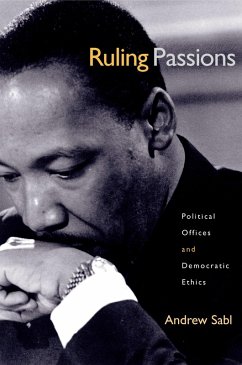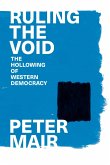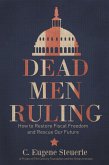How should politicians act? When should they try to lead public opinion and when should they follow it? Should politicians see themselves as experts, whose opinions have greater authority than other people's, or as participants in a common dialogue with ordinary citizens? When do virtues like toleration and willingness to compromise deteriorate into moral weakness? In this innovative work, Andrew Sabl answers these questions by exploring what a democratic polity needs from its leaders. He concludes that there are systematic, principled reasons for the holders of divergent political offices or roles to act differently.
Sabl argues that the morally committed civil rights activist, the elected representative pursuing legislative results, and the grassroots organizer determined to empower ordinary citizens all have crucial democratic functions. But they are different functions, calling for different practices and different qualities of political character. To make this case, he draws on political theory, moral philosophy, leadership studies, and biographical examples ranging from Everett Dirksen to Ella Baker, Frances Willard to Stokely Carmichael, Martin Luther King Jr. to Joe McCarthy.
Ruling Passions asks democratic theorists to pay more attention to the "governing pluralism" that characterizes a diverse, complex democracy. It challenges moral philosophy to adapt its prescriptions to the real requirements of democratic life, to pay more attention to the virtues of political compromise and the varieties of human character. And it calls on all democratic citizens to appreciate "democratic constancy": the limited yet serious standard of ethical character to which imperfect democratic citizens may rightly hold their leaders--and themselves.
Sabl argues that the morally committed civil rights activist, the elected representative pursuing legislative results, and the grassroots organizer determined to empower ordinary citizens all have crucial democratic functions. But they are different functions, calling for different practices and different qualities of political character. To make this case, he draws on political theory, moral philosophy, leadership studies, and biographical examples ranging from Everett Dirksen to Ella Baker, Frances Willard to Stokely Carmichael, Martin Luther King Jr. to Joe McCarthy.
Ruling Passions asks democratic theorists to pay more attention to the "governing pluralism" that characterizes a diverse, complex democracy. It challenges moral philosophy to adapt its prescriptions to the real requirements of democratic life, to pay more attention to the virtues of political compromise and the varieties of human character. And it calls on all democratic citizens to appreciate "democratic constancy": the limited yet serious standard of ethical character to which imperfect democratic citizens may rightly hold their leaders--and themselves.









